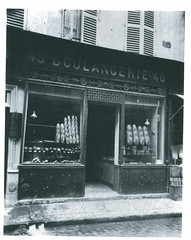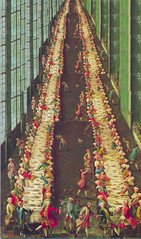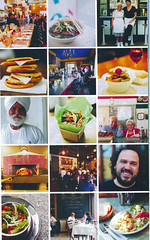Boulangerie Potatoes
 Boulangerie, 48 rue Descartes, Paris, Eugène Atget: who knows what secrets lurked within?
Boulangerie, 48 rue Descartes, Paris, Eugène Atget: who knows what secrets lurked within?
In Think Like a Chef, Tom Colicchio tells the story of how French villages used to feature a central boulangerie where, after the daily bread had been baked, the locals would gather to roast their dinners in the hot ovens. Meats would get roasted on the upper racks of the oven, while potatoes would be placed down below so that the wonderful flavors of the drippings from above—talk about nectar of the gods—would not go to waste, not unlike the way many rotisserie chicken operations here in Montreal still function today. Colicchio then offers up a oven-roasted potatoes recipe that sets out to replicate that “boulangerie effect” without the need for a big juicy roast or a trip to your local bakery (as if).
Boulangerie Potatoes
1/4 lb slab bacon
4 medium leeks, white parts only, trimmed
coarse salt and freshly ground black pepper
2 tbsp fresh thyme leaves
1 3/4 lbs starchy potatoes (such as Idaho), peeled
1 cup rich chicken stock + additional chicken stock, warm
2 tbsp unsalted butter
Heat the oven to 325º F. Slice the bacon into thin strips about 2 inches in length. Cut the leeks in half lengthwise, then slice them into thin semicircles. Cook the bacon over medium heat in a large skillet until rendered but not yet crisp, about 2 minutes. Add the leeks, salt, and pepper and cook, stirring frequently, until the leeks begin to soften, about 5 minutes. Add half the thyme leaves and cook, stirring frequently, until the leeks are tender, about 5 minutes more.
Cover the bottom of a medium baking dish with the leek mixture. Slice the potatoes very thin. Arrange them so that they overlap slightly and form rows over the leeks, as you would a Gratin Dauphinois. Pour the stock evenly over the potatoes, then dot them with butter and sprinkle with salt and pepper and the remaining thyme. Cover the pan tightly with aluminum foil and bake for 1 hour. Remove the foil and continue baking until the potatoes are tender, the edges begin to crisp, and the potatoes have turned golden, about 45 minutes more. You may need to add a bit more stock periodically. We did.
Serve warm.
Serves 4 as a side dish.
These were the best potatoes we’ve made, well, since the last time we made a Gratin Dauphinois, in all likelihood. There's no question they're rich in flavor and need to be matched with an appropriate main and probably a nice leafy salad, but they were easy to prepare and darn-near impossible to stop eating. We’re not 100% sure only because we ran out of potatoes before we found out. Prepare at your own peril.
aj









2 comments:
Hmmmm? My mother made those for us when we were growing up only she called them Potatoes Bernard. She no longer cooks, she is now 95 yrs old but still enjoys a good meal well prepared. As for the potatoes, well, plus ça change plus s'est pareil!
Hi anonymous,
"Potatoes Bernard," huh? Interesting. I wonder who Bernard was. I googled "potatoes Bernard" and "pommes de terre Bernard" but didn't pull anything up. Whatever the case this method is a sure-fire and very simple way to make outstanding potatoes. We served them with pollo al mattone and a leafy green salad. Perfect.
On another note: someone else posted a comment asking us about the city's best lasagne, but I can't find that comment for the life of me since we received it so I haven't been able to address it directly. Neither of us have come across a legendary lasagne in town to date. This may only be because we rarely order lasagne in restaurants, usually opting for things like gnocchi and ravioli instead if they're homemade. One of Michelle's favorite places for pasta is Via Dante (see our Food Guide for details). I wonder if they do a nice lasagne. Hmm... We'll look into it.
Post a Comment